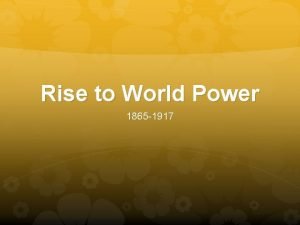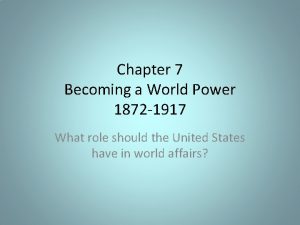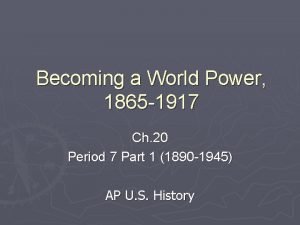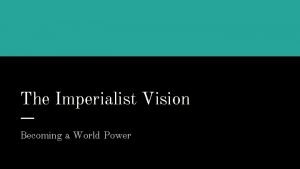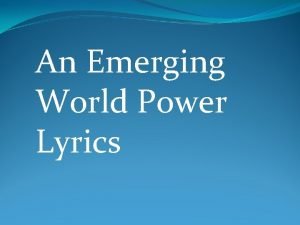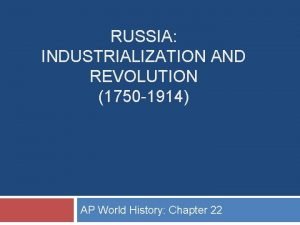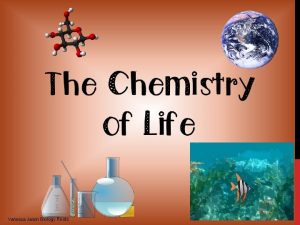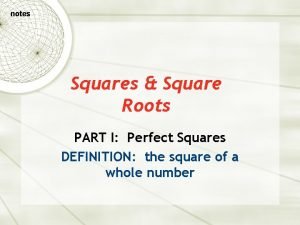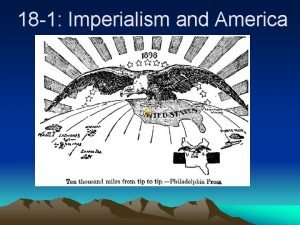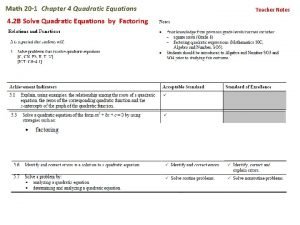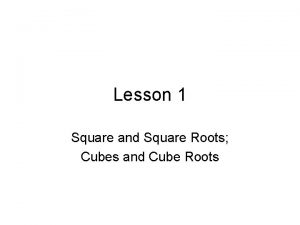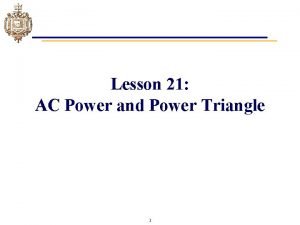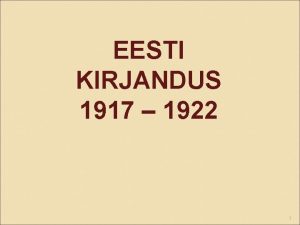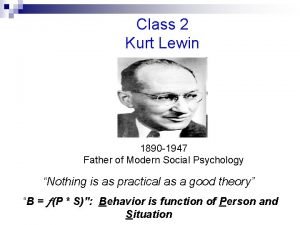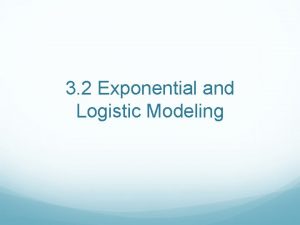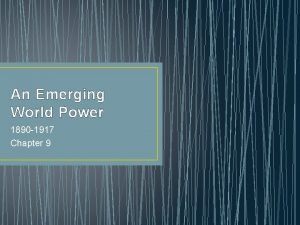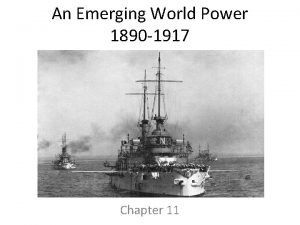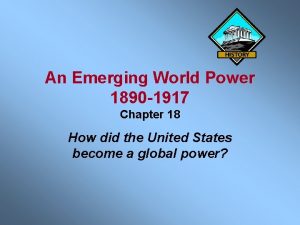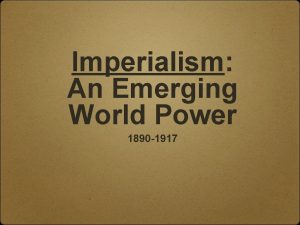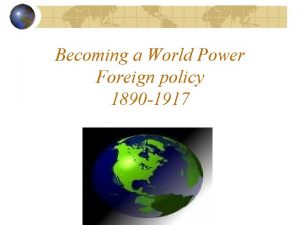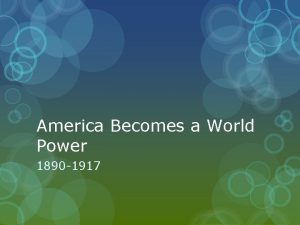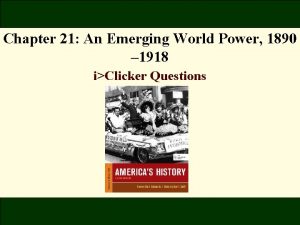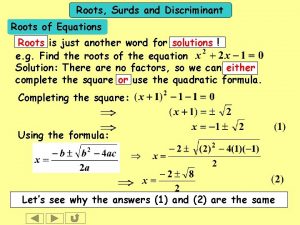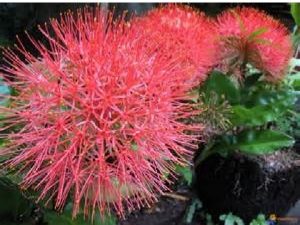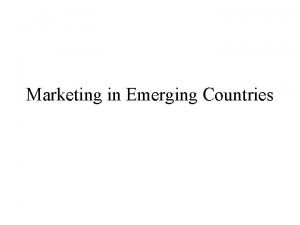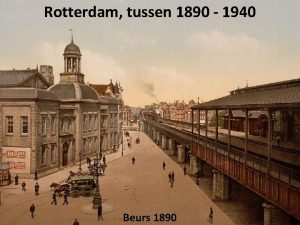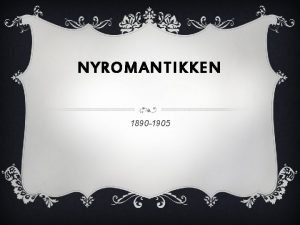An Emerging World Power 1890 1917 Roots of



















- Slides: 19

An Emerging World Power 1890 -1917

Roots of Imperialism n Before late 1890’s America had a limited role in world affairs n Worldwide Age of Imperialism- European countries, Japan established colonies to extract raw materials and resources


Roots of Imperialism n United States had surplus of goods to sell- manufactured items, farm products n Alfred T. Mahan during 1890’s urged American leaders to: n n n Build up navy Acquire foreign bases for supplies, fuel Build the Panama Canal n 1900 U. S. had 3 rd largest navy in the world

Roots of Imperialism Used to justify imperialism A. Advances in transportation, communication quickened pace of commerce B. Belief in national superiority C. Belief in Social Darwinism D. Tradition of “Manifest Destiny” n Frontier seen as “safety valve” for discontent, expansion became way to get rid of these feelings

America’s First Steps Toward World Power n Mid 1800’s take steps toward expanding trade, acquiring territory n 1853 Commodore Matthew Perry sailed American warships to Japan and forced open trade with Japan n 1860’s- 1870’s gained possession of Pacific Islands, built naval base at Pearl Harbor

America’s First Steps Toward World Power n 1867 William Seward, Secretary of State purchases Alaska from Russia for 7. 2 million n Doubled size of country n Ridiculed at first (Seward’s Folly), n Became valuable source of natural resources, expanded America’s reach across the Pacific

United States Acquires Hawaii n Since 1790’s U. S. merchants and n n n missionaries had been in Hawaii U. S. wanted Hawaii as a refueling station for trans Pacific journeys 1887 American planters convinced king to change constitution to give voting rights to wealthy landowners 1890’s economic crisis-high tariff made sugar prices too high New queen took rights away from planters 1893 planters overthrow queen U. S. Marines helped rebels

United States Acquires Hawaii n n Sanford Dole, leader of new government , asks U. S. to annex Hawaii, lower tariffs on sugar President Cleveland refused to sign agreement, apologized for American conduct 1897 California businessmen had close ties with planters Fear that Japanese would take over Hawaii Pressured President Mc. Kinley to annex Hawaii (1898)

Spanish American War n 1890’s Spanish empire weak, small n Included Cuba, Philippines, Guam, Puerto Rico n Cuban leader Jose Marti started war for independence, Spanish soldiers brutally put it down, place Cubans in concentration camps n American businessmen invested ($50 m) in sugarcane industry in Cuba, wanted stability

Causes of the War n Americans favored Cubans- fight for freedom, Spanish tactics gained sympathy n Businessmen worried about economic interest and wanted rebellion to end n Journalists heightened dislike for Spanish

Causes of War n Yellow Journalism- sensationalist headlines, exaggerated stories, shocking photos to win American sympathy n Heightened American jingoism (aggressive nationalism) n President Mc. Kinley warns Spanish to establish peace, ordered battleship Maine to Havana harbor to protect American citizens

Causes of War n 1898 battleship mysteriously blows up in Havana harbor n Newspapers blame Spain n Americans want war n Navy blockades Cuban ports n 200, 000 enlist in army n Congress passes resolutions for war Teller Amendment said U. S would not annex Cuba n Attempt to make war not look like a war of conquest n

Americans Fight in the Philippines n May 1898 American ships surprise Spanish navy in Manila Bay, destroy fleet n Guerillas led by Emilio Aguinaldo defeat Spanish army n August 1898 Spanish troops surrender to the United States

American Fight in Cuba n June 1898 Americans land n n Guantanamo Bay US Navy blockades weaker Spanish in Santiago harbor Troops poorly trained, poor weapons, not prepared for tropical climate (equipped for fighting Indians on the Great Plains) Two days later Americans defeat Spanish navy December 1898 Treaty of Paris ends war

Effects of the War n n n n What to do with new empire? Treaty of Paris gave U. S. control of Cuba, Guam, Puerto Rico U. S. paid $20 million for Philippines were biggest problem- ethnically diverse, but did not want islands to fall into hands of Germany, Japan, different culture, language and governmental institutions Questions of national identity- how would these new territories be assimilated into America (before all territorial acquisition eventually became states) Imperialists-American duty to “civilize” inferior people Profits for American investors Anti-Imperialists argued against expansion (cost, questioned consent of governed) n Had many prominent members Mark Twain, Andrew Carnegie, William Jennings Bryan among the leaders n 1898 - Treaty approved by Senate, America gains stature in the world

The United States and East Asia n American wanted to extend influence in Asia, compete with Europe, Japan, sell U. S. surplus n Americans put down a rebellion in the Philippines n Opened trade with China n Saw rising tensions with Japan

Filipinos Rebel Against the United States n Aguinaldo thought the U. S. was an n n n ally and Philippines would become independent U. S. decided to keep Philippines Aguinaldo organized insurrection, relied on guerilla warfare American military used extraordinary measures to put down insurrection Put Filipino citizens in concentration camps Spring 1901 captured Aguinaldo Insurrection did not end, but lowered the morale of guerillas

Filipinos Rebel Against the United States n American military used extraordinary n n n n measures to put down insurrection Put Filipino citizens in concentration camps 5, 000 Americans and 200, 000 Filipinos died $400 million spent fighting in Philippines 1901 William Howard Taft governor, censors press, jails insurgents Extended limited self rule, ordered construction of roads, schools 1916 Congress passes Jones Act allows for Philippine independence 1946 achieve independence
 Becoming a world power 1865-1917
Becoming a world power 1865-1917 Becoming a world power 1872 answers
Becoming a world power 1872 answers Chapter 20 becoming a world power notes
Chapter 20 becoming a world power notes Chapter 5 lesson 1 the imperialist vision answers
Chapter 5 lesson 1 the imperialist vision answers An emerging world power
An emerging world power Russian industrialization ap world
Russian industrialization ap world Vanessa jason biology roots answer key
Vanessa jason biology roots answer key Perfect squares
Perfect squares Existence and uniqueness of square roots and cube roots
Existence and uniqueness of square roots and cube roots Economic roots of american imperialism
Economic roots of american imperialism Roots of a quadratic equation
Roots of a quadratic equation What's a perfect square
What's a perfect square World heart federation emerging leaders
World heart federation emerging leaders Draw the power triangle
Draw the power triangle Africa 1890
Africa 1890 Kirjanik 1886-1971
Kirjanik 1886-1971 Lissauer 1890
Lissauer 1890 Kurt lewin (1890-1947)
Kurt lewin (1890-1947) Penholder tutuşu
Penholder tutuşu The population of smallville in the year 1890 was 6250
The population of smallville in the year 1890 was 6250
